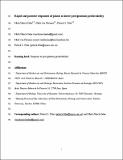Por favor, use este identificador para citar o enlazar a este item:
http://hdl.handle.net/10261/209800COMPARTIR / EXPORTAR:
 SHARE SHARE
 CORE
BASE CORE
BASE
|
|
| Visualizar otros formatos: MARC | Dublin Core | RDF | ORE | MODS | METS | DIDL | DATACITE | |

| Título: | Rapid and positive responses of plants to lower precipitation predictability |
Autor: | March-Salas, Martí; van Kleunen, M.; Fitze, Patrick S. CSIC ORCID | Palabras clave: | Local adaptation Environmental predictability Inter-seasonal predictability Multiple-generation experiment Phenotypic plasticity Transgenerational response |
Fecha de publicación: | 23-oct-2019 | Editor: | Royal Society (Great Britain) | Citación: | Proceedings of the Royal Society B: Biological Sciences 286: 20191486 (2019) | Resumen: | [EN] Current climate change is characterized by an increase in weather variability, which includes altered means, variance and predictability of weather parameters, and which may affect an organism's ecology and evolution. Few studies have experimentally manipulated the variability of weather parameters, and very little is known about the effects of changes in the intrinsic predictability of weather parameters on living organisms. Here, we experimentally tested the effects of differences in intrinsic precipitation-predictability on two herbaceous plants (Onobrychis viciifolia and Papaver rhoeas). Lower precipitation-predictability led to phenological advance and to an increase in reproductive success, and population growth. Both species exhibited rapid transgenerational responses in phenology and fitness-related traits across four generations that mitigated most effects of precipitation-predictability on fitness proxies of ancestors. Transgenerational responses appeared to be the result of changes in phenotypic plasticity rather than local adaptation. They mainly existed with respect to conditions prevailing during early, but not during late growth, suggesting that responses to differences in predictability during late growth might be more difficult. The results show that lower short-term predictability of precipitation positively affected fitness, rapid transgenerational responses existed and different time scales of predictability (short-term, seasonal and transgenerational predictability) may affect organisms differently. This shows that the time scale of predictability should be considered in evolutionary and ecological theories, and in assessments of the consequences of climate change. | Versión del editor: | http://dx.doi.org/10.1098/rspb.2019.1486 | URI: | http://hdl.handle.net/10261/209800 | DOI: | 10.1098/rspb.2019.1486 | Identificadores: | doi: 10.1098/rspb.2019.1486 issn: 0962-8452 |
| Aparece en las colecciones: | (MNCN) Artículos |
Ficheros en este ítem:
| Fichero | Descripción | Tamaño | Formato | |
|---|---|---|---|---|
| Filze_P_Rapid_and_Positive_Responses.pdf | 4,74 MB | Adobe PDF |  Visualizar/Abrir |
CORE Recommender
PubMed Central
Citations
5
checked on 21-abr-2024
SCOPUSTM
Citations
12
checked on 17-abr-2024
WEB OF SCIENCETM
Citations
12
checked on 29-feb-2024
Page view(s)
127
checked on 21-abr-2024
Download(s)
46
checked on 21-abr-2024
Google ScholarTM
Check
Altmetric
Altmetric
Artículos relacionados:
NOTA: Los ítems de Digital.CSIC están protegidos por copyright, con todos los derechos reservados, a menos que se indique lo contrario.
